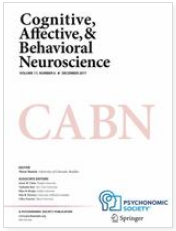Paper by Dr. Abe, Dr. Yanagisawa et. al. Published in Cognitive, Affective, and Behavioral Neuroscience
A Paper by Ryuhei Ueda (office assistant/graduate student/researcher, JSPS), Dr. Kuniaki Yanagisawa, Dr. Nobuhito Abe and colleagues was published in volume 17 of Cognitive, Affective, and Behavioral Neuroscience.
The study used functional magnetic resonance imaging (fMRI) to investigate whether implicit attitudes and executive control interact to regulate interest in extra-pair relationships.
The results indicated that monogamous relationships regulate amorous temptation affected by the combination of automatic and reflective processes.
 Ueda R, Yanagisawa K, Ashida H, Abe N (2017) Implicit attitudes and executive control interact to regulate interest in extra-pair relationships. Cognitive, Affective, and Behavioral Neuroscience 17 (6): 1210-1220
Ueda R, Yanagisawa K, Ashida H, Abe N (2017) Implicit attitudes and executive control interact to regulate interest in extra-pair relationships. Cognitive, Affective, and Behavioral Neuroscience 17 (6): 1210-1220https://link.springer.com/article/10.3758/s13415-017-0543-7
○Abstract
Do we actively maintain monogamous relationships by force of will, or does monogamy flow automatically? During functional magnetic resonance imaging (fMRI), male participants in a romantic relationship performed the Implicit Association Test (IAT) to evaluate implicit attitudes toward adultery and a go/no-go task to measure prefrontal activity implicated in explicit executive control. Subsequently, they were engaged in a date-rating task in which they rated how much they wanted to date unfamiliar females. We found that the individuals with higher prefrontal activity during go/no-go task could regulate the interest for dates with unattractive females; moreover, the individuals with both a stronger negative attitude toward adultery and higher prefrontal activity could regulate their interest for dates with attractive females, and such individuals tended to maintain longer romantic relationships with a particular partner. These results indicate that regulation of amorous temptation via monogamous relationship is affected by the combination of automatic and reflective processes.
Keywords : Monogamy fMRI Dual-process theory Implicit social cognition Self-control
2017/12/07